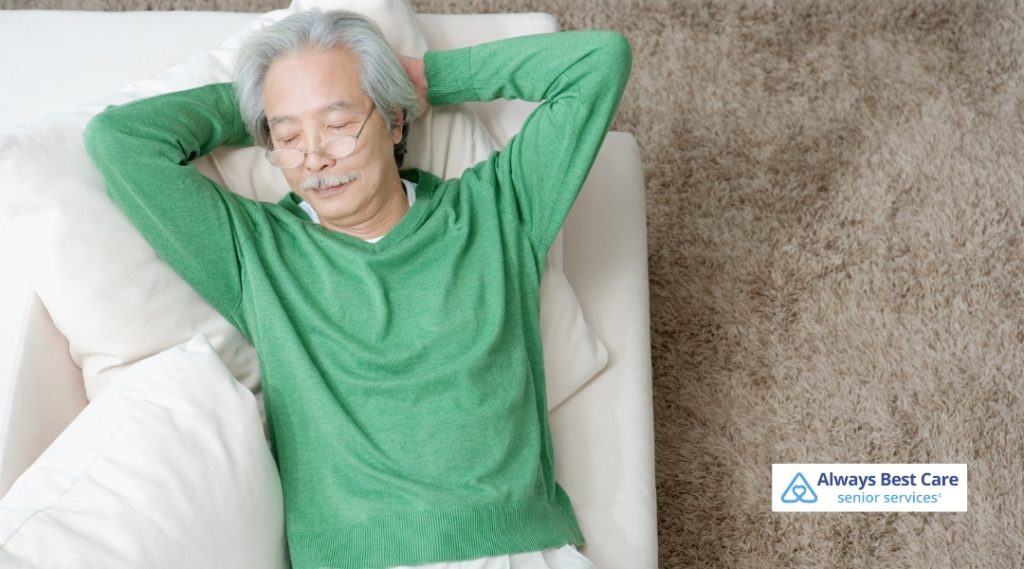Sleep Tips for Seniors: How to Get a Good Night’s Rest in Longview, TX

Getting a full night’s sleep should be one of life’s simple comforts—but for many seniors, restful sleep can feel just out of reach. Whether it’s waking up too early, struggling to fall asleep, or lying awake with a restless mind, these sleep challenges can leave you feeling drained and frustrated.
But a few thoughtful changes to your daily routine and sleep environment can make a world of difference. With a bit of guidance—and support from caregiving professionals when needed—seniors in Longview can rediscover the peace and renewal that come from truly restful nights.
Table of Contents
Why Seniors Struggle with Sleep
Many seniors find themselves battling insomnia, waking up early, or feeling as though they never truly get a restful night’s sleep, even after a whole night’s sleep.
One of the main reasons is a natural decline in melatonin production, the hormone that helps regulate sleep-wake cycles. As this production decreases, falling and staying asleep becomes more difficult. Seniors also tend to experience lighter sleep, spending less time in the deep, restorative stages that are vital for healing and renewal.
Physical discomfort from chronic conditions like arthritis, heart issues, or acid reflux can interrupt sleep, as can the need for frequent bathroom trips. Mental health plays a role too—loneliness, anxiety, or unresolved grief can surface more intensely at night, leading to restless thoughts and difficulty relaxing.

Creating a Consistent Sleep Routine
A reliable sleep routine can work wonders for seniors struggling with restlessness or insomnia. Going to bed and waking up at the same time each day, even on weekends, helps regulate the body’s internal clock, making it easier to fall asleep naturally and wake up feeling refreshed.
Start by setting a gentle evening rhythm: dim the lights, lower the volume at home, and engage in relaxing activities like reading, gentle stretches, or soft music.
Avoid stimulating activities or screen time in the hour leading up to bed, as they can make it harder for your mind to wind down. With consistency and patience, a steady routine can train the body to anticipate sleep and embrace it.
Making the Bedroom Sleep-Ready
A sleep-ready bedroom should feel cool, quiet, and comfortable. Consider blackout curtains to block early morning light, a fan or white noise machine to mask background noise, and soft, breathable bedding for maximum comfort.
For seniors, safety is just as important as comfort—clear walkways, soft nightlights, and easily accessible essentials can help prevent nighttime accidents and reduce anxiety. Removing distractions like televisions or digital screens can also improve rest, as these often emit blue light that interferes with melatonin production.
A thoughtfully arranged bedroom becomes more than just a place to sleep—it becomes a personal retreat designed to soothe and restore.

Eating and Drinking Smart Before Bed
What you eat and drink in the hours leading up to bedtime can significantly impact how well you sleep. Heavy, spicy, or sugary meals close to bedtime may lead to indigestion or restlessness. Likewise, caffeine—found in coffee, tea, chocolate, and even some medications—can linger in your system and delay sleep.
While alcohol might make you feel sleepy at first, it often disrupts the deeper stages of rest later in the night. Aim to finish dinner at least two to three hours before bedtime, and if a snack is needed, opt for something nutritious and light, such as a small bowl of oatmeal, a banana, or warm milk. Staying hydrated is essential, but it’s best to limit fluids in the evening to reduce nighttime trips to the bathroom.
Staying Active to Sleep Better
Physical activity helps regulate your body’s natural rhythms, reduces anxiety, and promotes deeper, more restorative rest. For seniors, even light forms of exercise, such as walking, stretching, tai chi, or gardening, can offer significant benefits.
The key is consistency—staying active during the day helps the body feel naturally ready to rest at night. Try to avoid strenuous exercise in the evening, as it can be too stimulating before bed. Regular activity also helps reduce discomfort from stiffness or pain, making it easier to relax and fall asleep with ease.

Managing Stress and Calming the Mind
A restless mind is one of the most common barriers to a restful night, especially for seniors who may carry stress, worry, or emotional weight into the evening hours. Developing a calming wind-down routine can help ease mental tension and prepare the mind for rest. Try quiet activities like journaling, meditation, listening to soft music, or practicing deep breathing.
Avoid watching the news or using electronic devices right before bed, as these can increase anxiety and disrupt melatonin production. Creating a peaceful mental space each night doesn’t just support sleep—it helps foster emotional well-being overall.
Reviewing Medications That May Be Affecting Sleep
Many seniors take multiple medications daily, and some of these can unknowingly interfere with sleep. Diuretics may cause frequent nighttime trips to the bathroom, while certain antidepressants, steroids, or heart medications can contribute to restlessness, vivid dreams, or insomnia. Even over-the-counter remedies, such as decongestants or sleep aids, can cause unintended disruptions.
If sleep has become a consistent issue, it’s essential to consult with your doctor or pharmacist about potential medication side effects. Sometimes, a simple change in dosage or timing can make a significant difference.

How In-Home Care Supports Better Sleep
Caregivers help establish healthy daily and bedtime routines, encouraging regular sleep and wake times that promote natural rest. They assist with evening tasks like bathing, dressing, and preparing a light snack—small gestures that help the body and mind wind down.
Safety is another key factor. Seniors who worry about falling during the night or navigating the home in the dark often sleep lightly or wake frequently. A caregiver provides peace of mind, whether through direct overnight assistance or simply helping prepare the bedroom for a secure, comfortable night’s rest.
In-home care also supports daily habits that impact sleep, such as staying active, eating a balanced diet, and managing medications. And when emotional stress or loneliness plays a role, the companionship caregivers provide can ease the mind and bring comfort.
At Always Best Care, our personalized in-home services are designed to nurture not just physical health, but restful nights and brighter mornings.
Seniors Can Combat Insomnia With Always Best Care of Longview!
At Always Best Care of Longview, we understand the challenges that come with aging, including sleep difficulties. Our compassionate caregivers can help establish a calming nighttime routine, assist with daily activities, and provide companionship to reduce stress and promote relaxation.
If you or a loved one is struggling with insomnia and needs extra support, we are here to help. Contact Always Best Care of Longview at (855) 822-2227 to schedule a care consultation and learn how our in-home care services can improve your quality of life. A restful night’s sleep is just a call away.





